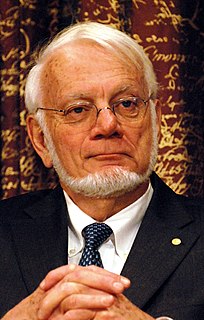A Quote by Scott Gottlieb
Printing novel DNA might open the way to achievements once only conceivable in science fiction: designer bacteria that can produce new chemicals, such as more efficient fuels, or synthetic versions of our cells that make us resistant to the effects of radiation.
Related Quotes
While the emphasis on effects became a catastrophe for science fiction, it was a relief for the capitalist culture of which 'Star Wars' became a symbol. Late capitalism can't produce many new ideas any more, but it can reliably deliver technological upgrades. But 'Star Wars' didn't really belong to the science fiction genre any way.
We are working to understand and regulate per- and polyfluoroalkyl synthetic chemicals, known as PFAS and PFOS, used to make water-repellent fabrics and non-stick products. These chemicals have been in prevalent use since the 1940s, but we need to learn more about their potential effects on human health and the environment.
It once seemed that the most profound feats stemming from DNA-based science would spring from our ability to read and detect genes, which we call the science of genomics. But the real opportunities lie in our ability to write DNA, to synthesize new gene sequences and insert them into organisms, resulting in brand-new biological functions.
We have 200 trillion cells, and the outcome of each of them is almost 100 percent genetically determined. And that's what our experiment with the first synthetic genome proves, at least in the case of really simple bacteria. It's the interactions of all those separate genetic units that give us the physiology that we see.
Nuclear industry proponents often assert that low doses of radiation (eg below 100mSV) produce no ill effects and are therefore safe. But , as the US National Academy of Sciences BEIR VII report has concluded, no dose of radiation is safe, however small, including background radiation; exposure is cumulative and adds to an individual's risk of developing cancer.
We've left the moment. It's gone. We're somewhere else now, and that's okay. We've still got that moment with us somewhere, deep in our memory, seeping into our DNA. And when our cells get scattered , whenever that happens, this moment will still exist in them. Those cells might be the biulding block of something new. A planet or star or a sunflower, a baby. Maybe even a cockroach. Who knows? Whatever it is, it'll be a part of us, this thing right here and now, and we'll be a part of it.
We all have weak moments, moments where we lose faith, but it's our flaws, our weaknesses that make us human. Science now performs miracles like the gods of old, creating life from blood cells or bacteria, or a spark of metal. But they're perfect creatures and in that way they couldn't be less human. There are things machines will never do, they cannot possess faith, they cannot commune with God. They cannot appreciate beauty, they cannot create art. If they ever learn these things, they won't have to destroy us, they'll be us.
Science fiction is a weird category, because it's the only area of fiction I can think of where the story is not of primary importance. Science fiction tends to be more about the science, or the invention of the fantasy world, or the political allegory. When I left science fiction, I said "They're more interested in planets, and I'm interested in people."



































